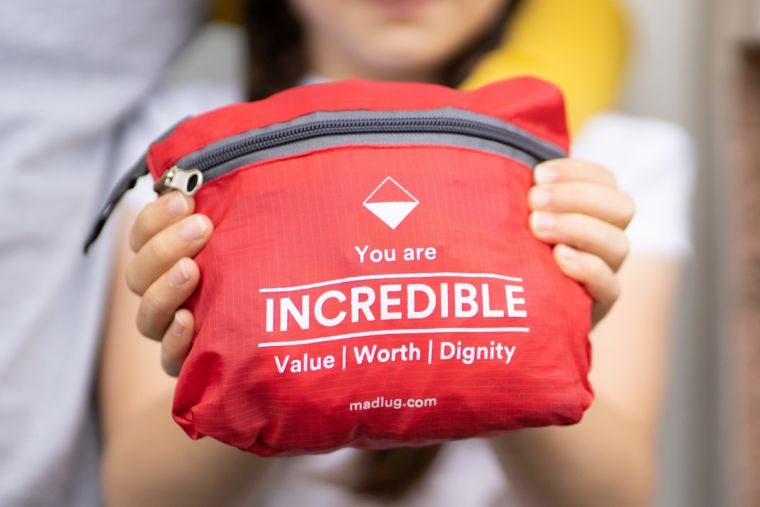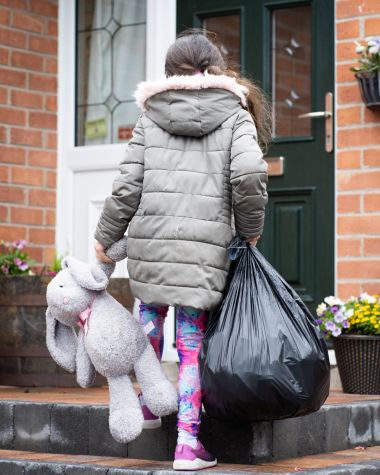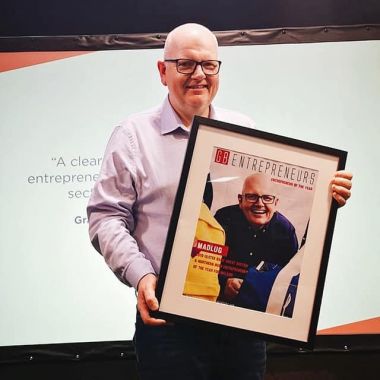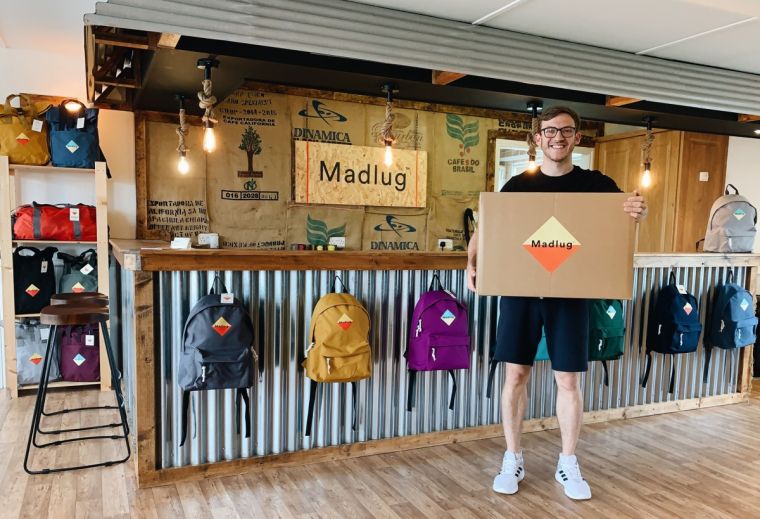Value, worth and dignity: the bag bringing a message of love to the thousands of children in care

Five years ago, Dave Linton and his wife were on a training course as they prepared to become foster parents when he heard the heartbreaking account of a young girl in care who didn't even have a bag for her personal belongings.
Dave came out of that training session determined to change this reality for the thousands of children in care who are forced to carry their personal belongings in bin bags.
Madlug was born out of the vision that for every bag bought, one would be donated to a child in care.
Dave speaks to Christian Today about why he is determined to restore the dignity of children in the care system, one bag at a time.
CT: The idea that a lot of care children don't even have a bag is something a lot of people probably have no idea about?
Dave: That's the reality when it comes to all issues around kids in care. Because they are under the age of 18, often the only people who really know the reality are social workers, school teachers or foster carers - anyone working with the children - but most of society doesn't know.
The reality is that when a child is moved around the care system, the trusts don't give them suitcases or luggage. Sometimes foster carers will loan them one but generally speaking, their stuff is moved in bin bags and they lose that dignity.
CT: How many children does this affect?
Dave: There are over 90,000 in care across the UK across England, Scotland, Wales and Northern Ireland. In the Republic of Ireland, there are a further 6,000-plus. So it's quite a large number. One child moves into care every 15 minutes - around 40,000 new children a year.

CT: In terms of the bag, what is the significance of a bag for a child in care and what does it mean for them when they get a Madlug bag?
Dave: Not having a bag means that they have to use plastic shopping bags - which are the new bin bags for today's children in care. These are disposable bags that we put rubbish into, and what that does is send the message to the children that they are worthless and that their things are worthless. When someone puts our things into something that is used for rubbish, it devalues the whole person. Those things many mean little to you but they mean so much to the child.
So the impact of receiving a proper bag on the children and young people in care is huge. And the more they know about Madlug, the more they are starting to see it as their brand. When they see somebody wearing a Madlug bag, it communicates to them that somebody cares about them. And it also empowers the consumer to communicate non-verbally that they care about children in care.
This matters because children in the care system often tell us that they feel lost in the system - adults are the ones making all the decisions, nobody sees us, nobody cares.
There's a perception among children in the care system that anyone who cares is someone who has been paid to care. The social workers are paid to care, and the teachers are paid to care. But with Madlug, we can say: look, people are paying to care. They're purchasing bags so that one can be donated to you. Wearing the bag communicates to the kids that we care and we see you.
CT: Shopping is so often about ourselves but the concept of Madlug turns that on its head to some extent.
Dave: The idea is to use the sale of bags to fund the giving of a bag to the children in care. I am very passionate about not taking vital funding and resources from frontline charities and agencies that are doing an incredible job to support them. That would be like trying to fix a bin bag and creating a problem somewhere else.
What we're trying to do is use a business model to generate profit from selling good quality bags so that this profit can give something back to the children in care. And we want to create awareness of the incredible children and young people who are in the care system. We just hired our first young person who is care-experienced and as we continue to grow as a company, we want to hire more care-experienced young people. It just brings a whole new dynamic to the company.
CT: Did you have any experience running a company before starting Madlug?
Dave: No! But the greatest gift God has given me is being dyslexic so I've always had this determination and am used to finding different ways of learning - I've never been someone who sees barriers. Alongside that, I've always had an interest in organisation, but never really a hunger for money, which is why I ended up in the youth work sector! I was often in places that didn't have a functioning youth ministry, or they had a youth ministry that was broken and needed a bit of fixing.
But through that, I learned a lot about business and the importance of being a good communicator, and of sharing the story. And since founding Madlug, I've become friends with and recruited people onto my board who have got amazing business skills and I've been able to learn under them.
CT: Your bags carry a message on the label. Why did you choose those words?
Dave: The three words we use are 'value', 'worth' and 'dignity', and they are the reason I'm so driven to do this. We actually talked with the kids about these concepts and they basically said: we want that on the bag.

To me, it's speaking prophetic Kingdom language over young people. I am a Christian leader but I recognise we're not building a Christian ministry. It's my ministry within a brand that's going wider than the Church but at the same time, the value, worth and dignity they have is the same. They have real value and real worth because God has created them in His image and because Christ died for them. The whole picture of the Good News of Jesus is inherent in our dignity.
The other things about the bags we create is that they are foldaway, and this is because of space. We can put 20 of them in one bag and give them to a social worker on the frontline who can then give them out to the children as and when needed.
But the bags fold up in such a way that those words 'value', 'worth' and 'dignity' show on the front so that every time the children see it, they are reminded that they have this incredible value, worth and dignity.
CT: You've just been added to the Joules Marketplace. How significant is that for a growing brand like yours?
Dave: We're very young in this but Joules is a global brand that stands for quality. Their 'Friends of Joules' scheme is invite-only. They look out for other brands they think their customers will like and so they came to us. It's still early days but that in itself tells us that our brand is strong, the message is strong, and now we have brand association with one of the biggest brands in the world. It's confirmation of what we're doing and affirming to our team that we're on the right track.
CT: It seems like consumer habits have been changing over the last decade or so and consumers are becoming more conscious of how they shop. Do you feel like we are there or do we still have some way to go in terms of shopping with a conscience?
Dave: I think we still have a long way to go. In our own research, we asked customers what part of the story had impacted their purchase and what we found was that people still buy what they like, what they see others wearing, and what they see being worn by the people they respect - celebrities, influencers and so on.
What we found with the conscious consumer is that the story plays a huge part after the purchase. It's lower down the line than we had expected but the positive for our brand is that people have been checking out our Instagram, following us, seeing pics of people wearing Madlug, and then making a purchase. The feel-good factor also helps to spread the word of the brand.
CT: Is your goal a bag for every child in care?
Dave: The thing about this problem is that it is global. Back in 2015, when I was first thinking about launching this, my idea was to go back to my youth group, collect their used bags and then donate them. But when I started to learn more about the numbers - the 90,000 in the UK - I realised it had to be much bigger than that.
The numbers in the UK are already high but if you go to America, there's half a million children in care. And in Australia and Canada, too, there are large numbers.
At the moment, we only operate in the UK but once we get a good grip of things and we start to see an end to the use of bin bags for the children here, we will look at another country and find a collaborative partner there.
Our dream is to take this to countries around the world and empower locals to be non-verbal communicators of love and care to kids who often feel unseen.
CT: Your mission isn't to make money but like other companies, you do still need to make money. The retail sector seems to be struggling a bit in the pandemic. Have you been hit by that?
Dave: Covid definitely hit us. At the start of it all, we were wondering what to do and whether we should close down temporarily or furlough our staff, and so on. But we felt really strongly that we couldn't say 'value', 'worth' and 'dignity' to kids in care and not show that to our staff.

Even in this unprecedented time of Covid, furloughing would have had a negative impact and so we decided not to furlough our staff. Instead, we decided to see any losses we made as an investment of time and resources spent thinking, planning and restructuring the brand. We changed it from a negative to a positive; that we were investing to grow the company.
We're starting to come out of the dip a little bit and are holding our own, and we actually cleared out most of our stock when an influencer bought a Madlug bag and posted about it on their Instagram. Thanks to that, we're just a little bit under where we were last year.
But I believe God has called me to this and I believe God is in control of all of this, and either He is who He says He is or He's a liar; there's no in between. With that perspective, we just went for it.
CT: There will be a lot of people in the Church who care about this issue but don't feel able to foster or adopt, or just aren't in the position to. What can they do to help children in care?
Dave: I am part of the advisory board in Northern Ireland for Home for Good, an organisation raising awareness of fostering and adoption, and encouraging more families in the Church to consider providing a home to children in care. But the issue is much bigger than that. The more we know about the kids in care - who are today's orphans - the more that the Church has got this amazing opportunity to offer wraparound care.
Not everyone is called to be a foster carer, or equipped or resourced to do it. When we started Madlug, we downsized our house so we don't have the capacity to foster, but we are still changing the lives of foster kids by doing something different.
There's a lot the Church can do to help foster families out. The consistent adult at the youth group or the person who calls them up for a cup of coffee; those things can make such a big difference to diffuse tensions in the home or encourage foster or adoptive parents who are struggling. The Church is full of people who can do that.











